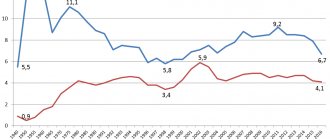Free legal consultation over the Internet 24 hoursLawyer on housing issues in St. Petersburg. Free legal consultation on labor disputes.
4.83/5 (23)
The main points in the law on municipal housing
People living in a municipal apartment have their own rights and responsibilities. First of all, tenants must pay utilities. The responsibility for maintaining the living space is entrusted to them. They have every right to privatize an apartment, register in it and much more. However, they are limited in some rights.
The concepts of “tenant” and “tenant of residential premises under a social contract” are almost the same. However, from a legal point of view there are differences. Relations that arise under a social tenancy agreement are regulated by Chapter Eight of the Housing Code of the Russian Federation. It is she who explains the concept of “tenant” and equates it to tenants.
The undoubted advantage of living in an apartment under a social tenancy agreement is that the tenant at any time has the opportunity to register ownership of the occupied living space. Since the early nineties, a privatization program began to operate. On its basis, any state or municipal housing becomes the property of an individual or legal entity completely free of charge.
Privatization rules are regulated by Federal Law of the Russian Federation N 1541-1 of July 4, 1991 “On the privatization of the housing stock of the Russian Federation” and Federal Law of the Russian Federation N 178 of December 12, 2001 “On the privatization of state and municipal property”.
Attention! Our qualified lawyers will assist you free of charge and around the clock on any issues. Find out more here.
Grounds for eviction
There are a number of situations in which a tenant may lose their living space in the %%currentyear%% year. Grounds for eviction:
- The main tenant in a municipal apartment has not paid utility bills for six months or more.
- Damage to living space by one of the residents, lack of proper maintenance of the property, creation of unsanitary conditions.
- Violation of the rights of neighbors ( if there is documentary evidence of this fact ).
- The premises are not used by the tenant for its intended purpose.
- Transfer of an apartment or other type of real estate from residential to non-residential. In this case, prior notification of residents is required.
- The emergency condition of the building makes it impossible to continue living in it.
In the last two cases, the state must provide citizens with another living space that meets all the norms and requirements of the law.
IMPORTANT! If residents are deprived of municipal housing due to the inability to pay utility bills, they must be provided with a place in a dormitory.
Municipal housing allows citizens in need of improved housing conditions to acquire housing. It is provided on the basis of the conclusion of an agreement and also upon the provision of a certain list of papers, which is specified in legislative acts.
Who is the employer
Nowadays, real estate owned by the state is leased to individuals, which is formalized in a social tenancy agreement. Previously, the basis for moving in was a warrant, but after changes were made to the Housing Code of the Russian Federation, an agreement was presented as it.
Those who received housing in the distant eighties still live in the apartment under a warrant. No one has the right to evict them. He is the only responsible person for paying utilities, as well as maintaining the premises. Based on this document, a person has the right to privatize real estate.
Now a person who owns residential government premises is called a tenant on the basis of a social tenancy agreement.
Is it possible to split utility bills?
Is it possible to get free housing in the village? Read here.
How the owner has rights in relation to property, read the link:
Important! The legislation of the Russian Federation defines a number of rules for persons applying for state real estate:
- having citizenship of the Russian Federation;
- the age of majority of the applicant for residential space;
- the legal capacity of the applicant, the ability to maintain housing in proper condition.
The rights of the tenant are described in Article 67 of the Housing Code of the Russian Federation. He is the subject of the contract. Any family member has the right to conclude a social rental agreement. The common area of the premises can be divided between relatives. However, such a procedure is practically not carried out, since it is not practical.
Documentation
Documents for free housing
In order to qualify for free housing, you need to collect and prepare a list of documents.
It is worth noting that it may vary in different regions - this point should first be clarified with the administrative authorities. The main documents include:
- Application for registration.
- Passport and birth certificate (for children).
- Marriage certificate.
- Certificate of family composition.
- Certificate of absence of other housing.
- Information about the income of all family members.
- SNILS of all family members.
Rights of the main tenant
The tenant of a state apartment is endowed with rights that will help him use the residential premises wisely and comfortably for its intended purpose.
These include:
- the tenant has the right to transfer the premises for use to other persons, including renting it out “for rent”;
- the tenant has the right to exchange the living space for another by mutual agreement with other tenants;
- require the owner to carry out major repairs free of charge;
- carry out repair work in the apartment, redesign the premises at any time convenient for the tenant;
- use utilities and pay for them from your own funds.
After the death of the direct tenant, members of his family have every right to live in the apartment, as well as to privatize it in the future. They are responsible for paying utility bills.
The tenant does not pay property tax, since in fact he does not own this residential space on a general basis.
Local government ownership system
By and large, this type of property includes objects of property of a specific territorial formation, representing an important role in its social existence with the preservation of cultural traditions and memory and equally serving to meet the needs of its population. Thus, municipally owned property can easily include budgetary funds of local importance, buildings and institutions owned by local authorities, various funds of budgetary and extra-budgetary importance, and others. Without highlighting particulars, all objects belonging to the municipal government can be divided into 2 main groups.
- The first group includes objects of municipal importance that were provided by local governments for ownership and use, as well as those assigned to municipal enterprises and formations.
- The second includes the treasury of local authorities, which is controlled and stored by the municipal authorities themselves, but has no relation to municipal institutions and enterprises.
The first group is responsible, first of all, for social and production tasks aimed directly at such areas.
- Education.
- Culture.
- Medicine.
There are several types of objects owned by municipal authorities
Note ! Most of the objects included in this group are unitary municipal organizations and other local enterprises. For example, these are libraries, schools, hospitals and other institutions.
The second group of objects performs tasks that relate to meeting the needs of the population located and living in a specific territory. Such property primarily replenishes the treasury of local government through tax payments. This group also includes the local budget, actual movable and immovable property of local authorities, municipal lands, etc. The municipal treasury is replenished with money from financial resources of the local budget, as well as with the participation of private enterprises not assigned to the municipal authorities.
It follows from this that municipal property is one of the main types of public property maintained under the control of the state. But despite this, all municipal property is not state property.
Municipal property is not state property
Its main activity can easily include assistance in resolving various types of problems and issues at the local level among institutions related to meeting the needs of society. In addition, property of municipal importance is needed both for the implementation by local government authorities of their direct tasks and responsibilities, and for the activities of municipal bodies and systems in general.
Note ! It follows a logical conclusion that this type of property, such as municipal, is the main attribute of the power of local government.
What responsibilities does an employer have?
It should be noted that the employer has not only rights, but also responsibilities that he must fulfill. They are specified in the contract.
These include:
- use the apartment for its intended purpose, that is, for permanent residence;
- carry out activities to maintain the apartment in proper condition, for example, carrying out cosmetic repairs, disinfection, daily tidying, etc.;
- pay the rent stipulated by the social tenancy agreement;
- make utility payments directly to the supply company or through the homeowner.
Please note! If the terms of the contract are not met, for example, the tenant does not pay utilities for a long time, the administration has the right to terminate the contract unilaterally or by court decision.
Rights of the employer's relatives under the law
Family members of a state apartment tenant also have certain rights. As a rule, relatives have the same rights as the employer himself. However, their distinction is made according to the degree of relationship.
Thus, the following have full rights to the apartment:
- spouses:
- natural and adopted children;
- parents;
- other relatives who are included in the contract as close ones.
If a new member appears in the family, for example, a child is born, he is registered with the consent of all relatives. Rights are confirmed by registration at the place of residence.
If the tenant wishes to register another person in the apartment, it is necessary to obtain permission from the owner. He has every right to refuse if the total area is not enough for other people to live. However, at the birth of a child, he does not have such powers. The baby is still registered at the place of residence of the parents.
The eviction of people registered in a state apartment occurs using the norms prescribed in Part 4 of Article 3 of the Housing Code of the Russian Federation. In other cases, the eviction is considered illegal.
Watch the video. The subtleties of owning a municipal apartment:
Features of registering children
Registration of children has its own characteristics. If the children have not reached adulthood, they can be moved in with their parents. In this case, the consent of the remaining family members, as well as the municipality, will not be required. In fact, if a person has received permission to move in, then subsequently, at his own discretion, he can register all his children. However, the law points to the fact that the municipality may refuse the interested party if this entails a reduction in the permissible area per person. To avoid problems in the future, the landlord and owner need to clarify how many children the initiator has, and whether he intends to live with them in the same premises.
Rules for registering a minor child
According to the current legislation of the Russian Federation, the child is registered at the place of registration of the parents. If spouses live separately, the place of registration is the living space where the child spends most of his time. However, parents are not deprived of the opportunity to register their child in the living quarters of the father or mother.
Remember! When registering a child at the place of residence of the parents, there is no need to obtain consent from the owner of the property, as well as other family members. The child is considered registered in the premises in any case, even if the landlord is against it.
In what cases can a tenant be evicted?
A tenant will lose a state apartment in several cases:
- the tenant does not pay utility bills for a long time, usually more than six months in a row. He has no valid grounds for failure to fulfill his obligations under the contract;
- using the apartment for another purpose, for example, opening a store in it, conducting craft, manufacturing activities, etc.
If a violation of the clauses of the contract is detected, the employer is given a warning and a period during which he is obliged to correct the defects (pay utilities, stop production activities).
If the employer has not eliminated all the shortcomings within the required period of time, the owner has the right to terminate the social tenancy agreement unilaterally.
Remember! If you are evicted from your apartment due to the fact that the house is intended for demolition or is recognized as unsafe, you must be provided with other housing with a similar area that meets sanitary requirements.
As a rule, a common occurrence is the eviction of a tenant due to debts for utilities. To avoid this, you should make payments on time or use an installment plan to repay the debt from the service provider company.
What happens after the death of a tenant: who can live
In the event of the death of the tenant, the living space belonging to him under a social tenancy agreement becomes the property of the state. Relatives who are not registered in the apartment do not apply for it.
However, there are some concessions:
- relatives have the right to obtain permission to live in an apartment by court decision;
- relatives who previously lived with the tenant have the right to continue living in a state apartment;
- a disabled person and persons caring for him live in the apartment.
The above categories of persons have the right to draw up a social tenancy agreement and live in the premises on the grounds set out in the Housing Code of the Russian Federation.
People applying for renewal of a social tenancy agreement must be indicated as family members in the original agreement concluded with the deceased.
Categories of citizens
In accordance with legislative acts, certain categories of citizens may apply for municipal housing in %%currentyear%%:
- orphans raised by the state;
- citizens who, due to their health status, pose a danger to others;
- military personnel, veterans, and persons equivalent to them;
- people who arrived from the Far North;
- people who were victims of the accident at the Chernobyl nuclear power plant.
In accordance with the law, it is necessary to document confirmation of belonging to one of the above categories. All members of the tenant's family receive equal rights when using the residential premises.









